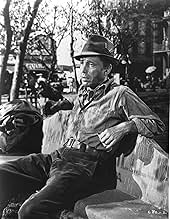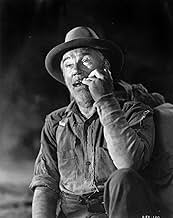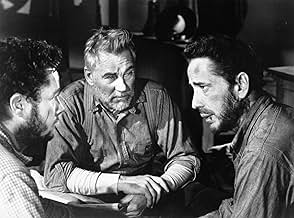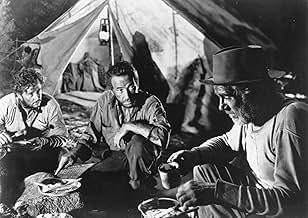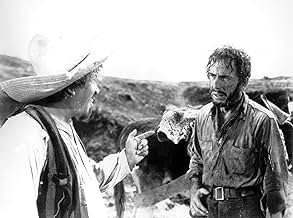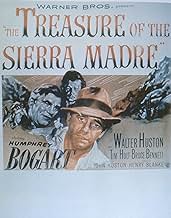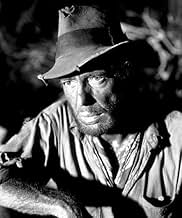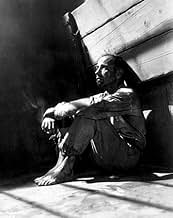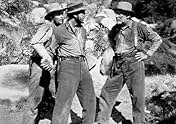Two down-on-their-luck Americans searching for work in 1920s Mexico convince an old prospector to help them mine for gold in the Sierra Madre Mountains.Two down-on-their-luck Americans searching for work in 1920s Mexico convince an old prospector to help them mine for gold in the Sierra Madre Mountains.Two down-on-their-luck Americans searching for work in 1920s Mexico convince an old prospector to help them mine for gold in the Sierra Madre Mountains.
- Won 3 Oscars
- 18 wins & 5 nominations total
Barton MacLane
- Pat McCormick
- (as Barton Mac Lane)
Arturo Soto Rangel
- Presidente
- (as A. Soto Rangel)
Manuel Dondé
- El Jefe
- (as Manuel Donde)
José Torvay
- Pablo
- (as Jose Torvay)
Robert Blake
- Mexican Boy Selling Lottery Tickets
- (uncredited)
Guillermo Calles
- Mexican Storeowner
- (uncredited)
Roberto Cañedo
- Mexican Lieutenant
- (uncredited)
Spencer Chan
- Proprietor
- (uncredited)
Jacqueline Dalya
- Flashy Girl
- (uncredited)
Ralph Dunn
- Flophouse Bum
- (uncredited)
Ernesto Escoto
- Mexican Bandit
- (uncredited)
- Director
- Writers
- All cast & crew
- Production, box office & more at IMDbPro
Summary
Reviewers say 'The Treasure of the Sierra Madre' is a critically acclaimed classic, lauded for its profound examination of greed, betrayal, and human nature. John Huston's direction and screenplay, alongside exceptional performances by Humphrey Bogart, Walter Huston, and Tim Holt, are often celebrated. The film's authentic atmosphere, intricate character studies, and moral complexities deeply resonate. Although some critique its pacing and subplots, most regard it as a timeless masterpiece noted for its psychological depth and thematic richness.
Featured reviews
In the 1920's, labor was hard to find. If you happened to be a laborer, work was almost non existent. Indeed, if you were unemployed and in Mexico, your chances were dismal. Yet, these were the times, which attracted many South of the border. The place was barren, yet many a fortune could spring up directly before you, . . .if you were luckily enough to see it. That is the story behind this incredible film. The legend of El Dorado was only one of the many myths which lured the adventurous to Mexico, another was "The Treasure of the Sierra Madre." The gold of the Mother of Mountains was passed from father to son for generations. Thus when the film adaption was made, it was sure to be sculpted by men of vision. One such man is legendary John Huston who directed this film. Three common men are lured by the promise of discovering a lost treasure. The first is Fred C. Dobbs (Humphrey Bogart) a nice enough guy who wants only to be fair, but is hungry to 'strike it rich.' The second is Howard, (Walter Huston) as honest as you expect him to be and a man of considerable experience. The last is Bob Curtin (Tim Holt) who if given a chance, will use it. The trio make a PAC to share and share alike all the treasure they find. However, only Howard is aware of what the possession of Gold can do to a man. To find the treasure, they need the mountain, some hard work, a little luck. To bring it home, will require something only one of them possesses. The film is a Classic and is due to the combined talents of all the stars and the director. If you look closely, you'll see Robert Blake (Barreta) and John Huston in brief roles. ****
This film is a sharp-edged study of the effects of greed on otherwise normal men, and one man in particular: Bogart's Fred C. Dobbs. Dobbs and Bob Curtin (Tim Holt) are down and out and meet up with prospector Howard (Walter Huston). When Dobbs wins a lottery, he uses the proceeds to finance a trip for the three to central Mexico to search for gold.
The three have to deal with the lawlessness of central Mexico at the time - bandits were actually on the loose in that country killing anybody with stuff, and taking that stuff. The Federales were a violent solution to a violent problem - killing the bandits after a summary judgement and the bandits having dug their own graves. So our trio not only have to worry about bandits once they strike gold, they have to worry about the darkness of their own souls.
In the beginning, Bogart's Fred C. Dobbs is a decent guy who does not take advantage of others. Dobbs only takes his money from the guy that wouldn't pay and he does share his lottery ticket and is generous with his fellow miners, but as greed begins to take root in him, little by little we see his goodness eaten away. It's a great credit to the writing and Bogart's skills that this is done gradually and played out over time. Incidentally, that's director John Huston "staking him to a meal". One of the best director cameos ever (although Polanski in Chinatown is equally great)!
Dobbs overestimates himself and the fallibility of human nature. Walter Hustons character freely admits what gold could do to any of them including himself. Dobbs is sure it will never happen to him, but he's never had anything, so he's never faced temptation, and when he falls it's a long way down.
This may be Tim Holt's finest performance - it was probably his finest opportunity given he had spent years laboring as a B western star on the RKO lot. Walter Huston as the prospector, minus his dentures and plus a bunch of pounds and with holes in his clothes is not the debonair fellow you are used to seeing in film . If Mary Astor's character in Dodsworth could have thought this was the future appearance of the man she loved, would she have taken her gondola in the other direction? I guess we'll never know.
Highly recommended as one of the great character studies in which several characters get studied in detail.
The three have to deal with the lawlessness of central Mexico at the time - bandits were actually on the loose in that country killing anybody with stuff, and taking that stuff. The Federales were a violent solution to a violent problem - killing the bandits after a summary judgement and the bandits having dug their own graves. So our trio not only have to worry about bandits once they strike gold, they have to worry about the darkness of their own souls.
In the beginning, Bogart's Fred C. Dobbs is a decent guy who does not take advantage of others. Dobbs only takes his money from the guy that wouldn't pay and he does share his lottery ticket and is generous with his fellow miners, but as greed begins to take root in him, little by little we see his goodness eaten away. It's a great credit to the writing and Bogart's skills that this is done gradually and played out over time. Incidentally, that's director John Huston "staking him to a meal". One of the best director cameos ever (although Polanski in Chinatown is equally great)!
Dobbs overestimates himself and the fallibility of human nature. Walter Hustons character freely admits what gold could do to any of them including himself. Dobbs is sure it will never happen to him, but he's never had anything, so he's never faced temptation, and when he falls it's a long way down.
This may be Tim Holt's finest performance - it was probably his finest opportunity given he had spent years laboring as a B western star on the RKO lot. Walter Huston as the prospector, minus his dentures and plus a bunch of pounds and with holes in his clothes is not the debonair fellow you are used to seeing in film . If Mary Astor's character in Dodsworth could have thought this was the future appearance of the man she loved, would she have taken her gondola in the other direction? I guess we'll never know.
Highly recommended as one of the great character studies in which several characters get studied in detail.
This film made a huge impression on me when I first saw it at the age of 15 or 16. A recent rewatching on DVD really served to bring home for me what makes this film so special.
The whole thing is quite good, but it really hits you when Howard goes off to celebrate with the Indians, leaving Dobbs and Curtin to care for his gold and burros. The ensuing scenes of their spiraling mistrust and tension are absolutely spellbinding--the kind of thing that makes you lean forward in your seat just to get your eyes a little closer to the raw humanity unfolding in front of you. Their paranoia, the way you can SEE scenarios of betrayal dancing in their eyes, Dobbs' burgeoning madness--these are the moments that make this film one for the ages.
At its best, film noir (which this most certainly is--Western surroundings or no) makes the viewer complicit in the evil depicted on screen. We find ourselves scheming and plotting in our heads along with the unsavory characters we are watching--we start to feel the same temptations and desires that they do. "Treasure of the Sierra Madre" accomplishes this bond with the audience as well as any film you are likely to see.
A magnificent film--one of the few great screen tragedies.
The whole thing is quite good, but it really hits you when Howard goes off to celebrate with the Indians, leaving Dobbs and Curtin to care for his gold and burros. The ensuing scenes of their spiraling mistrust and tension are absolutely spellbinding--the kind of thing that makes you lean forward in your seat just to get your eyes a little closer to the raw humanity unfolding in front of you. Their paranoia, the way you can SEE scenarios of betrayal dancing in their eyes, Dobbs' burgeoning madness--these are the moments that make this film one for the ages.
At its best, film noir (which this most certainly is--Western surroundings or no) makes the viewer complicit in the evil depicted on screen. We find ourselves scheming and plotting in our heads along with the unsavory characters we are watching--we start to feel the same temptations and desires that they do. "Treasure of the Sierra Madre" accomplishes this bond with the audience as well as any film you are likely to see.
A magnificent film--one of the few great screen tragedies.
Tampico sets the scene for the start of speculation, Fred C. Dobbs is out of cash and his luck is in cessation, but an encounter in flophouse, and big dreams emerge and arouse, as a plan is born with Howard, and a fellow who's called Curtin. Into hills laden with gold, our companions then embark, finding seams that come alive with golden riches to impart, building up substantial fortune, thinking soon they will be tycoons, but there's one who's trust is waning and has sores that start to smart. The journey back becomes a challenge to them all, as one by one the group is scattered, battered, stalled, will their work be well rewarded, will endeavours all be thwarted, either way, you will be engaged, and quite possibly enthralled.
Bogarts best performance.
Bogarts best performance.
Having had his day as an idolized star and romantic leading man, it was now time for Bogart to get down to the serious business of acting
For eighteen years it had usually been Bogart playing Bogart in various shadings
Now that Bogart was gone and in his place was an older and far less romantic figure, one who found new challenges and was able to meet most of them successfully
This new phase of his continued growth began with a story of three men in search of gold
Although "The Treasure of the Sierra Madre" is indisputably one of Bogart's best films, it was co-star Walter Huston who won an Academy Award as did the movie's director and scenarist, John Huston
Based on a novel by the mysterious B. Traven, the film told a riveting tale which explored the degenerative effects of encroaching greed, distrust, and hatred on three prospectors who team up to search for gold in Mexico
Bogart's Fred C. Dobbs was an amazingly complex creation whose slow disintegration into paranoia was brilliant1y managed on camera He is a born loser with no potential for change in sight Suspicious, unfeeling, savage, and easily corruptible, he seems clearly destined for a tragic fate almost from our first meeting with him
Tim Holt was also excellent as Bob Curtin, a man who, like Bogart, is tempted but whose conscience will not permit him to exercise his baser desires. (He could have let Bogart die in a cave-in, but saved him instead.) Young, impressionable, and unprepared, he has never seen the likes of a Fred C. Dobbs and he finds himself overwhelmed and uncertain as to how he will cope with Dobbs's rage and greed
However, it is the director's father, Walter Huston, who literally stole the picture from both Bogart and Holt as he played Howard, a wise old toothless codger who knew all along what would happen and took it all in stride, kicking up his heels and having a marvelous time Life can't surprise him any more He's already had successes and failures enough for one lifetime Like a faithful dog, he's along for the thrill of the hunt, and should there be another pot of gold at the end of this rainbow, well, that's just a bonus
It is mainly the interaction of these three men from their first meeting and uneasy partnership through their final confrontation that made "The Treasure of the Sierra Madre" one of Warner Brothers' triumphs of the forties
Although "The Treasure of the Sierra Madre" is indisputably one of Bogart's best films, it was co-star Walter Huston who won an Academy Award as did the movie's director and scenarist, John Huston
Based on a novel by the mysterious B. Traven, the film told a riveting tale which explored the degenerative effects of encroaching greed, distrust, and hatred on three prospectors who team up to search for gold in Mexico
Bogart's Fred C. Dobbs was an amazingly complex creation whose slow disintegration into paranoia was brilliant1y managed on camera He is a born loser with no potential for change in sight Suspicious, unfeeling, savage, and easily corruptible, he seems clearly destined for a tragic fate almost from our first meeting with him
Tim Holt was also excellent as Bob Curtin, a man who, like Bogart, is tempted but whose conscience will not permit him to exercise his baser desires. (He could have let Bogart die in a cave-in, but saved him instead.) Young, impressionable, and unprepared, he has never seen the likes of a Fred C. Dobbs and he finds himself overwhelmed and uncertain as to how he will cope with Dobbs's rage and greed
However, it is the director's father, Walter Huston, who literally stole the picture from both Bogart and Holt as he played Howard, a wise old toothless codger who knew all along what would happen and took it all in stride, kicking up his heels and having a marvelous time Life can't surprise him any more He's already had successes and failures enough for one lifetime Like a faithful dog, he's along for the thrill of the hunt, and should there be another pot of gold at the end of this rainbow, well, that's just a bonus
It is mainly the interaction of these three men from their first meeting and uneasy partnership through their final confrontation that made "The Treasure of the Sierra Madre" one of Warner Brothers' triumphs of the forties
Did you know
- TriviaIn his Oscar acceptance speech, Walter Huston said, "Many, many years ago, I brought up a boy and I said to him, 'Son, if you ever become a writer, try to write a good part for your old man sometime'. Well, by cracky, that's what he did!"
- GoofsThere are background noises from wildlife in parts of the movie. One of which is the unmistakable call of the Australian kookaburra.
- ConnectionsFeatured in The Screen Writer (1950)
- SoundtracksBelieve Me If All Those Endearing Young Charms
(1808) (uncredited)
Music traditional
Played on harmonica by Walter Huston
Details
- Release date
- Country of origin
- Languages
- Also known as
- El tesoro de la Sierra Madre
- Filming locations
- Kernville, California, USA(Kelly's Rainbow Mine)
- Production company
- See more company credits at IMDbPro
Box office
- Budget
- $3,000,000 (estimated)
- Gross US & Canada
- $5,014,000
- Opening weekend US & Canada
- $144,074
- Jan 14, 2018
- Gross worldwide
- $5,014,124
- Runtime
- 2h 6m(126 min)
- Color
- Aspect ratio
- 1.37 : 1
Contribute to this page
Suggest an edit or add missing content


